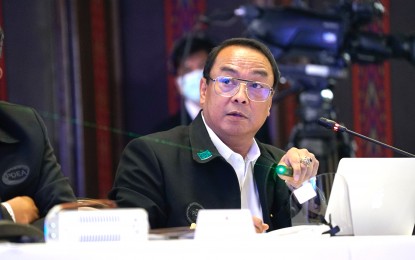
(File photo from PPD)
MANILA – The national anti-drug campaign has never been stronger until President Rodrigo Duterte's administration came along, and recognition was widely received in the local and international communities, criticisms included.
During the Duterte Legacy Summit at the Philippine International Convention Center in Pasay City on Tuesday, Philippine Drug Enforcement Agency (PDEA) Director General Wilkins Villanueva said the deaths were the result of violent actions by drug personalities against the anti-narcotics authorities during lawful arrests.
He challenged the government’s drug war critics to investigate and ask the people "whose domiciles belong to the drug-cleared barangays on what they are enjoying right now."
“To the persistent critics (of the government’s drug war campaign) who contend that the drug war is a failure, I respect your right to free speech. You (critics) may have articulated your opinions based on what you see or hear in the news and not on actual experiences,’’ he said
“In my book, no one else but the residents of drug-cleared communities make the best judge to tell precisely if the war on drugs is a success or not,’’ he said.
Villanueva noted that the government’s all-out war against illegal drugs started when President Duterte made the commitment to solve the “gargantuan and decades-old problem in just a short period of time.”
Stressing that the government values human lives, Villanueva said second chances were given to drug personalities “who wish to right their wrong and thread the road to recovery.’’
“Taking human life was never the intent of anti-drug operations. Let us remember that on the side of law enforcement, PDEA also had its share of casualties,’’ he said.
Villanueva admitted that there are multiple deaths during legitimate anti-drug operations but it pales in comparison to the numerous counts of drug suspects apprehended.
“A lot has been said that the President has not kept his promise to rid illegal drugs in his first six months of office. He admittedly underestimated the severity of the drug problem,’’ he said.
“We can stop the selling the moment we stop those who are buying. Not one person resorts to drug-peddling if nary a soul patronizes it,’’ Villanueva said.
With the government’s intense anti-illegal drug campaign, Villanueva said peace and order have reigned supreme and community progress abounds as what people will typically reply.
The PDEA chief said the “Barangay Drug Clearing Program (BDCP)’’ assumed the role of the catalyst under the Philippine Anti-Illegal Drug Strategy (PADS).
Villanueva said PADS embodies a “whole-of-the-nation approach in addressing the country’s drug menace.’’
“Spurring growth of healthy communities that are free from the ill effects of illegal drugs has become the holy grail of the BDCP,’’ Villanueva said.
He said the BDCP has enlisted the support of all the stakeholders, duty bearers and local government units (LGUs) in the barangay drug clearing operations which earned “successful high impact’’ results.
This led to the billions of pesos worth of confiscated dangerous drugs and the arrest of high value targeted drug personalities which were considered “large-scale accomplishments.’’
Recognizing the circumstances, Villanueva said that the Duterte administration has built community-based reformation centers that continued to flourish in the local communities.
In its latest Real Numbers data as of April 30, authorities have seized a total of PHP89.29 billion worth of narcotics across the country since the start of the Duterte administration's crackdown on illegal drugs in mid-2016.
The PDEA said the items included PHP76.55 billion worth of shabu.
Authorities have destroyed 8,177.79 kilograms (kg) of shabu, 4,226.08 kg of marijuana, 21.93 kg of ecstasy, 534.20 kg of cocaine, and 3,483.67 kg of other dangerous drugs.
A total of 1,156 drug dens and 19 clandestine shabu laboratories were dismantled from July 2016 to April 2022.
A total of 15,096 high-value targets (HVTs)nationwide were arrested -- 6,768 HVTs from high-impact operations; 4,043 target-listed suspects; 1,670 drug den maintainers; 797 drug group leaders/members; 529 government employees; 402 elected officials; 364 foreigners; 295 included on wanted lists; 126 uniformed personnel; 78 armed group members; and 24 prominent personalities.
Authorities also arrested 341,494 other individuals involved in illegal drugs.
The 4,372 arrested minors include 2,635 pushers; 1,004 possessors; 453 users; 246 visitors to drug den; 10 drug den maintainers; 18 drug den employees; three cultivators, one lab employee; and two runners.
The rescued minors, after court proceedings, were turned over to the Bahay Pag-asa reform centers of local government units within eight hours of police custody, before turning them over to the Department of Social Welfare and Development.
At least 25,061 out of the 42,045 villages are now drug-cleared; 6,574 are drug unaffected/drug-free; and 10,410 have yet to be cleared of illegal drugs.
The villages have reached drug-cleared status after the issuance of a certification by members of the oversight committee.
The consolidated report showed that 6,248 suspects died during 236,620 anti-illegal drug operations. (PNA)
